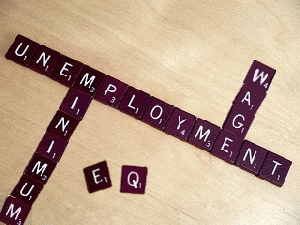When Thomas Piketty in Capital in the Twenty-First Century and Pope Francis speak out against income inequality, they get tarred with charges of advocating communist beliefs and practices, and accused of engaging in the politics of envy of the 'one-percenters' that have been rewarded for risk-taking and hard work. This implies that a solution to income inequality is hard work. Anything that rewards people for less than hard work is bad and harms personal responsibility. One way to reward people for less than hard work is by extending their unemployment benefits. If the unemployed cannot expect to receive unemployment benefits, they are more likely to expedite their job search effort. Extending unemployment benefits can also lead to higher wages, which decreases the demand for labor, thus causing the unemployment rate to be persistently high. (See: National Review) Clearly, the jury is still out on the effects of extending unemployment benefits to the long-term unemployed because the contrarian argument alleges that extending benefits increase income that in turn is spent on goods and services in the economy. In the first case, failure to extend unemployment benefits will not solve income inequality because it would incentivize the unemployed to stay out of the labor market longer. Thus, income will not rise nor will long-term unemployment fall. Note: "average weekly benefits are just 74 percent of the poverty threshold for a family of four." Hardly enough to encourage laziness. (See: Joint Economic Committee} The unemployment benefits also prevent people from leaving the labor force permanently, which can harm economic growth. In addition, if you're long-term unemployed and your benefits are ended, the gap between your income and that of the income of the top one-percent certainly widens in a simple straightforward way.
The historical stagnation of the minimum wage raises the inequality gap between the top one percent and minimum wage earners. Speaker Boehner refuses to bring the minimum wage bill to a vote because, according to him, the minimum wage would lead to an increase in unemployment, perhaps business would substitute capital for labor. However, a higher minimum wage puts more money in the hands of lower income people with a high marginal propensity to consume, thus increasing spending.
The debate surrounding the solution to income inequality--in the present political climate in the U.S.--remains contentious and intractable. One could get around this with a do-it-yourself search for the truth by conducting a study that looks at the relationship between raising the minimum wage and the unemployment rate. Then you would need to believe only the facts revealed by the data. To start, get historical data that include the years the minimum wage was raised and unemployment rate data. Next, determine statistically if there is any correlation the two series. Data are readily available from government sources (you can Google it). Do this and you'll not have to rely on partisan bias to inform your thinking.
Answers derived from your study might not explain the problem of income inequality or what policies to implement to solve it, provided you believe a solution is necessary. But like stagnant wages, an unchanging minimum wage is symptomatic of a society willing to accept both a flat wage profile and sees nothing wrong with 95 percent of the gain in income since 2008 going to the top 1 percent. The impartially of the market made this judgment, so they assert; government interference produces undesirable distortions in outcomes like money-is-speech and corporations-are-people decisions that invest power in inanimate things that real people manipulate for personal--rather than social--gains. How does the government "right" this disparity in income shares? What are the tools available to the government? Raise the minimum wage? Extend unemployment benefits? None of these things will happen in the present political climate--given the power and intransigence of some members of Congress, so we can look forward to more income inequality. On the other hand, if there is no relationship between the minimum wage and the unemployment rate, raising the minimum wage will matter little for the economy but minimum wage earners' income will increase.
An easy way to determine any relationship between the minimum wage and economic growth is via correlation between the two variables, which shows whether the data series move together. But this does not address causality between them. Nevertheless, this approach offers some insight into what is going on between the two series. Data on minimum wage for the period 1978 to 2013 from the U.S. Department of Labor and economic growth (computed from US GDP by Year) demonstrate a correlation of 0.0176, which shows a scant positive relationship between changes in the minimum wage and economic growth. Similarly, the correlation for the same period between the unemployment rate and the minimum wage is 0.116. Again, the relationship between these two variables is positive--implying some meager link between the two series, although one cannot conclude that changes in the minimum wage caused the changes in unemployment. We could conclude ways to reduce U.S. inequality by: First, raising the minimum wage to narrow the inequality gap, raise purchasing power and spending on U.S. good and services; Second, extending unemployment benefits--which, rather than delaying job searches, would put money in the pockets of the unemployed and increase spending.





